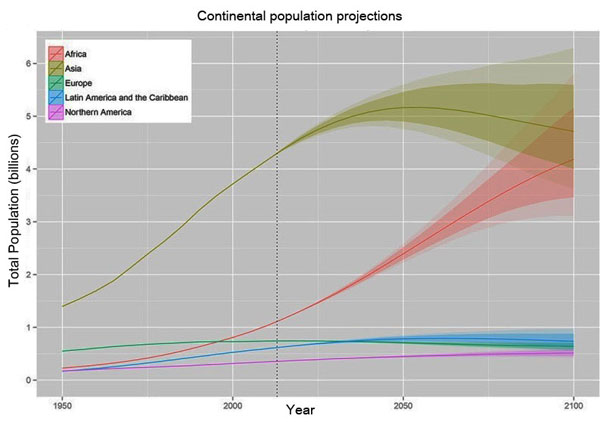Global Demographics and White Survival: What Is to Be Done? Part VI
Michael Walker, American Renaissance, November 2, 2017
This essay is part of our symposium on “the world’s most important graph.” 
We asked our contributors to answer the following questions: “What should the white West do about this prediction, and what will we do about it?”
Know the facts: The population of Africa is 1.2 billion; Europe’s, including the Africans in Europe, is 739 million. Africa’s birth rate is 4 percent, leading its population to double every 20 years. In the 1950s, there were 275 million people in Africa — 9 percent of the world’s population. In the 1990s, the figure was 650 million, or 12 percent. By 2050, the French writer Bernard Lugan estimates that 40 percent of the all births in the world will be in Africa (Bernard Lugan, Osons dire la verité à l’Afrique).
One social scientist comes to mind — one whose predictions were supposedly disproved by the march of events, but perhaps only deferred and not disproved: Thomas Malthus.
In his book An Essay on the Principle of Population, published in 1798, Malthus argued that when food production in a closed system is increased, population increase must follow; however, population growth outstrips food production because it rises exponentially, while food production does not, causing famine. This assumes that the demand of the population on resources is higher than the capacity of resources to meet that demand. In the 20th century, both Marxists and free-marketers concluded that Malthus’ predictions were baseless, arguing that he ignored the ability of science to meet the challenge of population growth.

Thomas Malthus
In The Population Bomb (1968), Paul Ehrlich forecast global famine within 15 years. In 1972, the Club of Rome published its neo-Malthusian Limits to Growth, which disputed the notion that population growth was intrinsically beneficial. Critics of anti-growth politics have been swift to point out that environmentalist predictions of famine or the depletion of fossil fuels have proved to be exaggerated, and over-pessimistic warnings have made it easier to dismiss the dangers of rapid population growth in Africa.
People who claim that the pessimists “were proved wrong then and will be proved wrong again” overlook three factors. First, China and India, for which people like Ehrlich had predicted widespread famine, have managed to keep their populations fed only at grievous cost to the natural environment. Both China and India are heavily polluted, with population growth arguably acting as a break on potentially higher living standards. Second, population growth slumped in proportion to the rise of an educated but financially strapped and ambitious middle-class. Third, harsh counter-measures to reduce population growth were undertaken, including one child per family policies and mandatory sterilization.
Left to their own devises and unsupported by the West, Africans would already be suffering the full brunt of Malthusian logic. As it is, deserts have expanded and small holdings have been destroyed by war and drought, driving millions off the land and into the cities. Population growth in Africa means urban growth. The population of Lagos in 1960 (at the time of Nigerian independence) was 763,000. In 2017 the population has reached 17.5 million. When African cities are unable to sustain massive urban populations, hungry millions will look to Europe. What should and will be done about it? Should the cry be “open borders” and “love will find a way?” This is not fanciful: A policy of “open borders” has moved from ultra-left to mainstream.
As many people as possible should be made aware of the dramatic facts of African population growth, facts which politicians and media are playing down. The choice is stark. Either halt population growth rates or exponentially increase food production, or a combination of both. Or accept the end of Western prosperity.
What practical options are there? Emigration out of Africa should be made as hazardous and difficult as possible, whilst opportunities for Africans in Africa should be improved. The very first measure has to be a closing of European borders, national and continental, to mass migration. Individuals and organizations active in encouraging emigration out of Africa should be pursued and prosecuted, with capital punishment an option for people smugglers. NGO’s not cooperating should be closed down under emergency laws introduced for that purpose. No funding should be provided to anyone or any organization involved in “open border” activities.

New York, October 3, 2011 — George Soros, founder and chairman of the Open Society Foundations, attends a news conference at the UN headquarters. Mr. Soros spoke on “The Millennium Villages Project,” a science-based partnership in rural Africa working to achieve the Millennium Development Goals. The program will move into its next and final phase with more than 72 million U.S. dollars in new pledges, including 47.4 million U.S. dollars from Mr. Soros himself. (Credit Image: © Xinhua via ZUMA Wire)
Secular-leaning movements should be backed by the West across North Africa, which, when in power, will stop migrants from crossing their territory. The only permissible aid to Africa should be to governments whose priority is to make their nations self-sufficient and that seek to promote feasible small farming, desert reclamation, energy saving, and all measures to support self-sufficiency and deter emigration. All other forms of government aid should stop. There should be an immediate ban on all arms exports to Africa. War in Africa has created havoc with agriculture, the very activity which should be given every possible aid and encouragement. Aid should be made dependent on birth control measures. African trainees and graduates in Western countries, especially in the field of medicine, should not be granted post-graduate residence permits in the West. They should return to practice in their home countries.
Every effort should be undertaken to disabuse Africans of the delusion that large families are a key to prosperity. The association of large family with prosperity stems from pre-colonial times, when disease decimated every family. The old belief in the blessing of big families is supported by Mohammedan and Christian clerics. The West should combat them without apology. In contrast to China and India, there is little hope that African nations can reach a higher standard of living unassisted. However, with support for micro-economics and the facilitation of business payments via smart phone — which has made transactions safe and easy in Africa — small business and agriculture can thrive in times of peace.
A return to a more settled, rural economy in Africa would be a huge challenge. Europe should work with others on this global problem. China and Middle East nations are investing heavily in Africa and making substantial land purchases to ensure food supplies for their own peoples. They can have no interest in accelerating African population growth into the areas they seek to exploit.
Finally, there is the African himself. Overpopulation, insecurity, and war will continue to push him first towards the growing cities and then to the West. Unopposed, the migration not of tens of thousands but tens of millions will destroy order in Europe along with the benefits migrants hope to find there. The alternatives to the above solutions are grim: a military response to migration or an ostrich approach towards those who believe in open borders.
But what will Europe do? This question cannot be answered, beset as the situation is with unforeseeable eventualities. One works for the best, prepares for the worst. What is certain is that the more individuals, movements, commentators, and associations think and act in a state of awareness, the more likely it will be that society will respond. The longer the situation is ignored, the worse it will become. It will be small consolation to anyone who has defended Malthus against his more unthinking critics to be able to say, as the millions arrive, “You see? I told you so.”
















